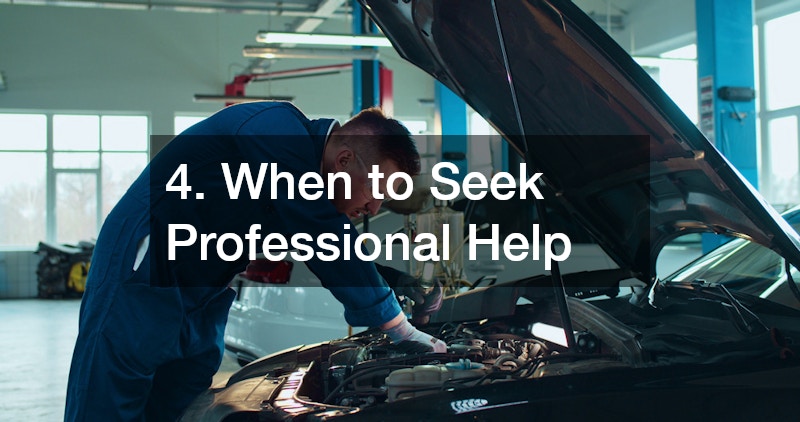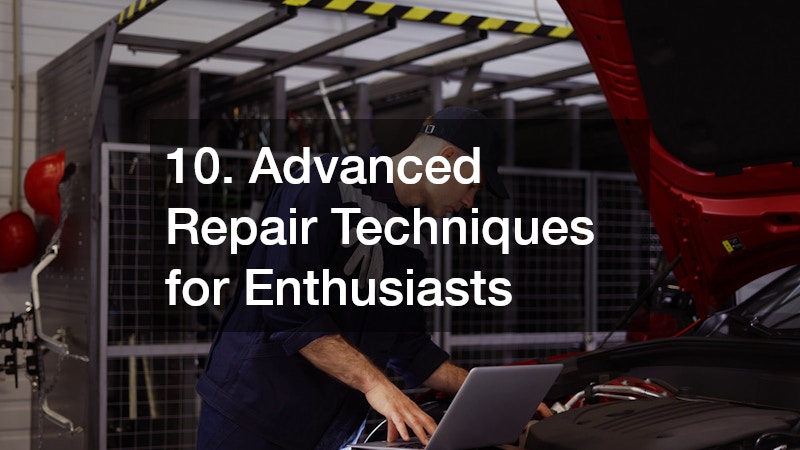Auto repairs can often seem like an overwhelming challenge. However, by understanding some excellent repair facts, you can simplify the process significantly. Having a firm grip on the essentials of auto repair not only boosts your confidence but also ensures that you maintain your vehicle effectively. Whether confronting routine maintenance needs, diagnosing an issue, or contemplating a complex fix, these insights will provide you with a clear path forward. Throughout this article, we’ll delve into key areas that help every car owner take control of their vehicle’s maintenance. Armed with this knowledge, novice drivers and seasoned enthusiasts alike can approach auto repairs with newfound ease and assurance.
One of the first steps in taking control of auto repairs is becoming familiar with your vehicle’s owner’s manual. It outlines recommended service intervals, fluid types, and system alerts, all of which are critical in preventing unnecessary wear and tear. Understanding what each dashboard light means can also help you identify problems early, saving time and avoiding more expensive repairs. It’s equally important to choose the right repair shop. Look for certified technicians, transparent pricing, and good customer reviews. Don’t hesitate to ask questions about the diagnosis or request a written estimate before authorizing any work. Many reliable shops also offer warranties on parts and labor, giving you peace of mind.
Additionally, tracking repair history and staying consistent with oil changes, brake checks, and tire rotations can extend your car’s lifespan and help maintain its resale value. Learning the basics—like how to check fluid levels or change a tire—can also prevent you from getting stranded during an emergency. By developing a proactive approach and staying informed, you’ll reduce stress, save money, and keep your vehicle running smoothly for years to come. Repair knowledge doesn’t just protect your car—it empowers you as a driver.
1. How to Diagnose Common Car Problems

Understanding how to diagnose car problems is a critical component of excellent repair practices. Often, unfamiliar noises or dashboard warning lights indicate that something may be amiss. Knowing how to interpret these signs can save you an unnecessary trip to auto repair shops and empower you to handle minor issues yourself. This foundational knowledge enriches your interaction with mechanics, ensuring clear communication about your car’s condition.
When diagnosing car problems, it’s essential to start with basic checks. This means examining fluid levels, inspecting the battery and alternator, and using On-Board Diagnostics (OBD) tools to read error codes. By doing so, you can identify whether the issue lies with auto electric services or if it might require something more specific, like an auto detailing service for aesthetic repairs.
The goal is to prevent small issues from becoming larger, more costly ones. Through diligent observation and routine diagnostics, drivers can engage in excellent repair habits. This not only saves time and money but also contributes to vehicle longevity, making everyday drives safer and more assured.
2. Essential Tools for Auto Repair
Having the right tools on hand is paramount when it comes to executing excellent repair techniques. At the very least, every vehicle owner should have a basic toolkit that includes items like wrenches, screwdrivers, and jacks. Many auto repair shops recommend these essentials for handling minor repairs and maintenance tasks at home.
Beyond the basics, investing in tools like torque wrenches, socket sets, and multimeters can significantly enhance your repair capabilities. Such tools are imperative, especially when dealing with more intricate repairs that require precision. For example, tasks related to auto electric services are made considerably easier with the proper instrumentation.
Ultimately, the right tools not only streamline the repair process but also boost your confidence as a DIY mechanic. With quality tools and knowledge of their application, you can tackle an array of repairs efficiently, embodying the principles of excellent repair practices.
3. The Importance of Regular Maintenance
Regular maintenance is a cornerstone of excellent repair strategies, playing a crucial role in preventing more significant issues. Consistently following a maintenance schedule helps in identifying potential problems early, thus avoiding the inconvenience of unexpected breakdowns. Windshield companies and auto repair shops both agree that staying ahead of maintenance needs is essential for vehicle longevity.
Maintenance tasks such as oil changes, tire rotations, and brake inspections ensure that your vehicle remains in peak condition. Moreover, other services like car windshield replacement can contribute to safety by preserving visibility. By adhering to these routines, you protect your investment and save on costly repairs down the road.
Incorporating regular check-ups into your car care regimen reflects a commitment to excellent repair practices. Not only does it solidify your vehicle’s reliability, but it also provides peace of mind, allowing drivers to experience worry-free journeys.
4. When to Seek Professional Help

Recognizing when to call in the professionals is a skill that underscores truly excellent repair intuition. While DIY efforts can cover a broad spectrum of tasks, certain problems are better left to the expertise of certified mechanics. This is especially true for intricate systems such as those related to auto insurance claims and major mechanical failures.
Seeking professional assistance is crucial when facing issues that require specialized knowledge and tools, like complex engine repairs or specialized services such as an auto tinting service. Not only do these professionals guarantee quality results, but they also ensure that repairs meet industry standards and safety regulations.
Having access to a trusted mechanic or repair shop offers valuable peace of mind. Being confident in your ability to identify when to engage a professional is an integral part of excellent repair practice, ensuring that your vehicle receives the right care when it matters most. Needing to talk to an auto accident attorney is another situation where a professional is best.
5. How to Save Money on Auto Repairs
Cost-efficiency is often top of mind for vehicle owners when considering excellent repair approaches. One effective way to save money is by handling simple tasks yourself, like replacing air filters, changing engine oil, or swapping brake pads. Completing these minor projects can reduce the frequency and cost of visits to auto repair shops.
Additionally, developing an understanding of preventative maintenance can help cut costs significantly. Staying proactive in areas such as regular oil changes, tire inspections, and alignment ensures that you avoid more expensive repairs down the line. Consulting with windshield companies or using auto electric services for timely interventions can also stave off larger bills.
Partner your DIY efforts with strategic purchases, such as using coupons and discounts offered by local repair shops or exploring bulk purchases of essential supplies. Together, these methods embody excellent repair philosophies that emphasize smart, economical choices without compromising quality or safety.
6. Tips for DIY Auto Repairs
The notion of DIY in auto repair emphasizes excellent repair efficiencies and empowerment through knowledge. Before beginning any DIY project, it’s crucial to conduct thorough research, understanding both the potential challenges and safety precautions involved. Familiarizing yourself with your car’s manual and seeking out instructional videos can be invaluable.
One of the most useful tips for DIY enthusiasts is to start with the simpler tasks. Basic jobs such as changing spark plugs or replacing the car battery can build confidence and skills. Addressing minor repairs ensures your progression into more advanced tasks, helping you gradually develop your expertise.
Ultimately, patience and precision are key in any repair situation. By taking your time and following steps carefully, you uphold the tenets of excellent repair practices. With each successful repair, you gain insights and a sense of accomplishment, solidifying your capability as a self-sufficient vehicle owner.
7. Evaluating Auto Repair Shops

Choosing the right auto repair shops involves more than just proximity; it’s about finding quality you can trust. An excellent repair experience starts with thoroughly researching options in your area and verifying the credentials and certifications of these services. Look for positive customer reviews and BBB ratings to help streamline your decision-making process.
A successful auto shop blends expertise with excellent customer service, communicating repairs clearly and offering realistic estimates. Inquire about warranties and guarantees, ensuring that repairs performed are both reliable and backed by the shop’s promise of quality. Consider shops that are respected for their specialty in different services, such as auto fabric repair or car windshield replacement, depending on your needs.
Opting for the right repair shop is integral in maintaining your vehicle’s performance and longevity. By engaging with shops that embody excellent repair values, you ensure each repair enhances the reliability and safety of your vehicle. This brings peace of mind, knowing that your vehicle is in capable hands.
8. Understanding Auto Repair Warranties
An often-overlooked component of auto repairs is understanding the warranties that back services and parts. Excellent repair practices include not only the execution of repairs but also the protection of those repairs through proper warranties. These assurances provide a safety net, guarding against unforeseen issues that might arise post-repair.
Each repair service, be it an audi repair or general maintenance, often comes with unique warranty terms. It’s essential to understand the coverage offered, including what parts and services are included and what’s excluded. This information allows you to make informed decisions about where and how to conduct your repairs.
Furthermore, retaining all documents and receipts related to warranties guarantees that claims can be processed smoothly if needed. By prioritizing warranties in your repair strategy, you uphold excellent repair standards, ensuring comprehensive care and protection for your vehicle investment.
9. Preventive Repair Practices
Adopting preventive repair practices is vital for maintaining excellent repair health and extending the vehicle’s life. Regular checks and upkeep can preempt major problems, translating into significant savings over time. Simple tasks, like routinely checking fluid levels and scheduling inspections, form the backbone of preventive care.
In-depth care, including services such as car windshield replacement, should be preemptively approached to maintain safety and comfort while driving. Windshield companies often recommend replacing damaged or cracked glass promptly to avoid exacerbating the issue or compromising vehicle integrity.
In addition to mechanical vigilance, maintaining the car’s appearance through auto detailing services also plays into preventive practice. A clean vehicle is less susceptible to corrosion and wear, bolstering both the aesthetic and functional aspects of your vehicle. Thus, prevention is a multifaceted component of excellent repair ideology, promoting wise investments in care for future dividends.
10. Advanced Repair Techniques for Enthusiasts

For the true enthusiast, advancing into more sophisticated repair techniques represents the pinnacle of excellent repair mastery. This often involves engaging with auto fabric repair or complex mechanical systems that require a nuanced understanding of automotive mechanics. Such expertise demands dedication and continual learning, including participation in workshops or courses.
Some advanced repairs, akin to tackling high-performance modifications or in-depth electronic diagnostics, can significantly enhance a car’s performance and aesthetic. A high level of proficiency here often translates into being self-reliant, with the added benefit of tailoring repairs to bespoke specifications.
Ultimately, the pursuit of advanced techniques underscores a commitment to excellence and passion for automotive care. Enthusiasts who embrace this journey not only master their craft but also inspire others, creating a ripple effect of excellent repair practices within the automotive community. With each advanced technique you conquer, your vehicle becomes an embodiment of your skill and commitment.
Incorporating These Excellent Repair Facts
Armed with these excellent repair facts and insights, you can tackle auto repairs with greater knowledge and confidence. Whether you’re opting for DIY repairs or deciding when a professional touch is required, having a well-rounded understanding of the essentials ensures smoother and more cost-effective repair experiences. Through regular maintenance and smart repair decisions, you protect your vehicle’s value and functionality. Remember that, beyond the technical skills, cultivating excellent repair habits means acknowledging when you need to consult experienced professionals. This balance reduces stress, enhances safety, and secures your vehicle’s longevity. Ultimately, the insights shared within this article can guide and inspire auto enthusiasts and everyday drivers alike to approach car repairs strategically and efficiently, fostering a legacy of care and expertise. By applying these principles, your vehicle is bound to serve you well, maximizing durability and performance in every journey you undertake. If you have any more questions, visit a local auto shop, and they should be able to help you.
